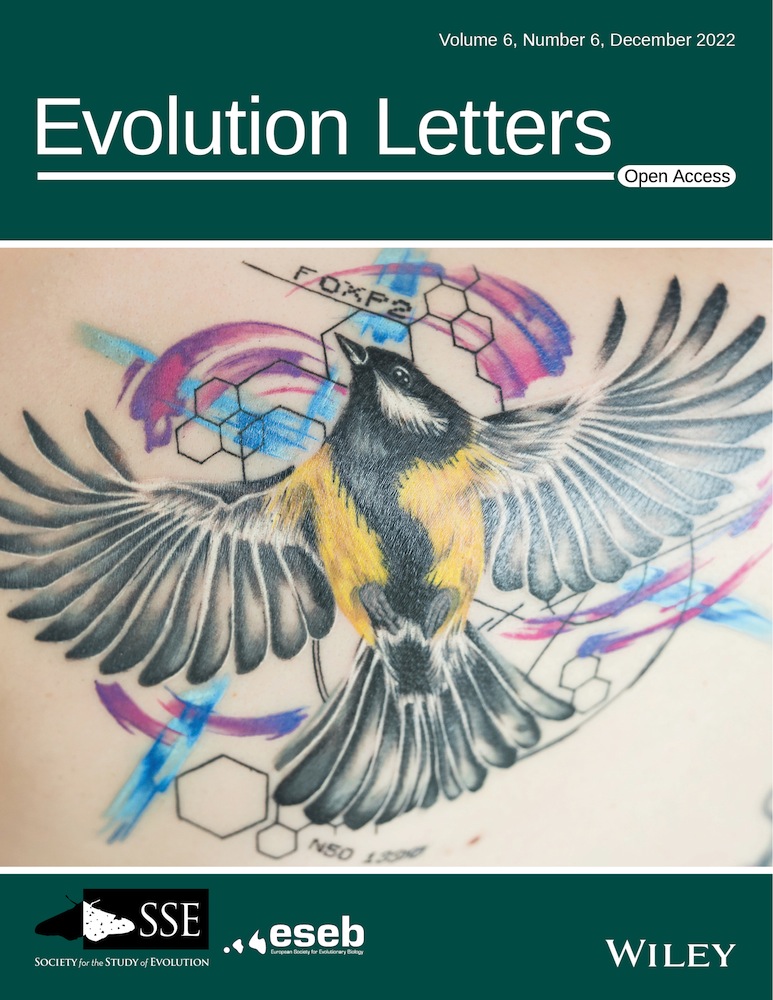Pollinator sharing and hybridization in a pair of dioecious figs sheds light on the pathways to speciation
IF 3.4
1区 生物学
Q2 EVOLUTIONARY BIOLOGY
引用次数: 0
Abstract
Abstract The dynamics and processes underlying the codiversification of plant–pollinator interactions are of great interest to researchers of biodiversity and evolution. Cospeciation is generally considered a key process driving the diversity of figs and their pollinating wasps. Groups of closely related figs pollinated by separate wasps occur frequently and represent excellent opportunities to study ongoing diversification in this textbook mutualism. We study two closely related sympatric dioecious figs (Ficus heterostyla and Ficus squamosa) in Xishuangbanna, southwest China, and aim to document what is likely to be the final stages of speciation between these species using a combination of trait data and experimental manipulation. Volatile profiles at the receptive phase, crucial for attracting pollinators, were analyzed. In total, 37 and 29 volatile compounds were identified from receptive F. heterostyla and F. squamosa figs, respectively. Despite significant interspecific dissimilarity, 25 compounds were shared. Ovipositor lengths lie well within range required for access to heterospecific ovules, facilitating hybridization. Cross introduction of wasps into figs was conducted and hybrid seeds were generated for all donor/recipient combinations. F. heterostyla wasps produce adult offspring in F. squamosa figs. While F. squamosa wasps induce gall development in F. heterostyla figs and their offspring fail to mature in synchrony with their novel host. We record limited geographic barriers, minimal volatile dissimilarity, compatible morphology, complementary reproductive phenologies, and the production of hybrid seeds and wasp offspring. These findings suggest ongoing wasp specialization and reproductive isolation, potentially applicable to other related fig species.一对雌雄异株无花果的传粉者共享和杂交揭示了物种形成的途径
植物与传粉者相互作用的共同多样化的动态和过程是生物多样性和进化研究的重要内容。合作通常被认为是推动无花果及其传粉黄蜂多样性的关键过程。由不同黄蜂授粉的亲缘关系密切的无花果群经常出现,并代表着在这一教科书互惠共生中研究持续多样化的绝佳机会。本文研究了西双版纳两种密切相关的同域雌雄异株无花果(Ficus heterostyla和Ficus squamosa),目的是利用性状数据和实验操作相结合的方法来记录这些物种之间可能的物种形成的最后阶段。分析了对吸引传粉者至关重要的受精期挥发性特征。共鉴定出37种挥发性化合物和29种挥发性化合物。尽管种间差异显著,但共有25种化合物。产卵器的长度在进入异种胚珠所需的范围内,有利于杂交。在无花果中进行了小黄蜂的杂交引种,所有供体/受体组合都获得了杂交种子。异花柱小黄蜂在鳞状小黄蜂中产生成虫。而鳞状小黄蜂诱导异花柱小黄蜂的瘿发育,其后代不能与新寄主同步成熟。我们记录了有限的地理障碍,最小的挥发性差异,相容的形态,互补的生殖物候,以及杂交种子和黄蜂后代的生产。这些发现表明正在进行的黄蜂专业化和生殖隔离,可能适用于其他相关的无花果物种。
本文章由计算机程序翻译,如有差异,请以英文原文为准。
求助全文
约1分钟内获得全文
求助全文
来源期刊

Evolution Letters
EVOLUTIONARY BIOLOGY-
CiteScore
13.00
自引率
2.00%
发文量
35
审稿时长
10 weeks
期刊介绍:
Evolution Letters publishes cutting-edge new research in all areas of Evolutionary Biology.
Available exclusively online, and entirely open access, Evolution Letters consists of Letters - original pieces of research which form the bulk of papers - and Comments and Opinion - a forum for highlighting timely new research ideas for the evolutionary community.
 求助内容:
求助内容: 应助结果提醒方式:
应助结果提醒方式:


